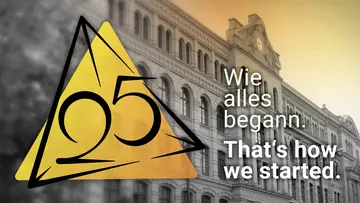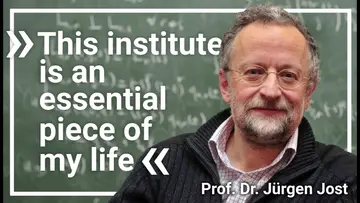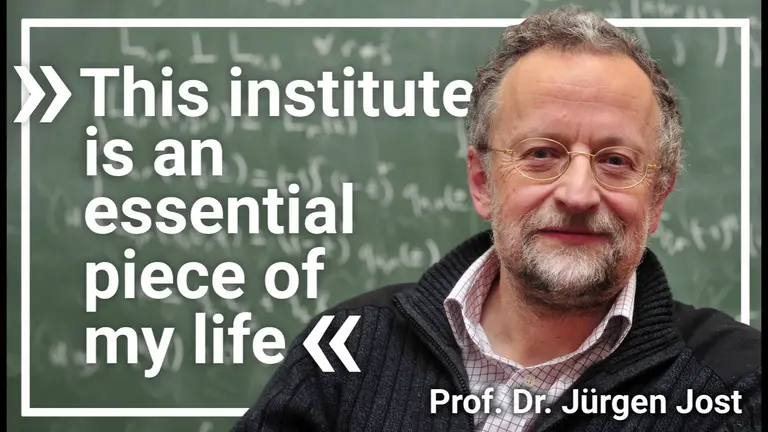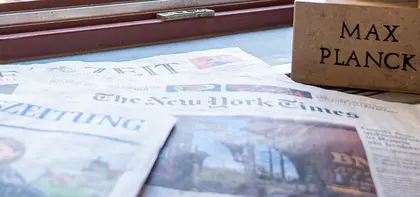
Episode 3 — “This institute is an essential piece of my life” – Interview with Prof. Dr. Jürgen Jost
Published Apr 8, 2021
Prof. Dr. Jürgen Jost founded our institute in 1996 together with Prof. Dr. Eberhard Zeidler and Prof. Dr. Stefan Müller and accompanied it as director and working group leader through the entire 25 years. We are very pleased that he shares some memories, thoughts and inspirations with us in this interview.
Prof. Jost, what fascinates you about mathematics and what made you decide to become a mathematician?
Mathematics is a very precise tool of thinking and allows me to develop concepts and understand structures. I know this sounds very abstract at first. When asked how I got into it, I could of course say mathematics came easy to me or I was always good at mathematics in school, as is the case with most mathematicians. But actually, it's a little different. I wanted to become a scientist. The fact that it actually became mathematics was a bit coincidental. Ever since my school days, it has always been my dream to understand reality and what surrounds us, what constitutes matter, life, consciousness and so much more. I initially studied various subjects to varying depths and breadths: Mathematics, Physics, Economics and Philosophy. And it turned out that I was able to do a PhD in mathematics very quickly (and at the age of 23) in a very highly topical and rapidly developing field of research. I seized this opportunity, became a mathematician, and focused on special mathematical research, solving concrete problems and thus building my reputation as a scientist.
In 1996, you moved from the Ruhr University Bochum to a Max Planck Institute in eastern Germany and shifted your center of life to Leipzig. What did this mean for you and your family?
Founding a Max Planck Institute and becoming Max Planck Director is, of course, a great opportunity. Such a prominent and well-equipped scientific position can be found practically nowhere else in the world. I was very happy to seize this opportunity, somewhat to the chagrin of my parents, who hoped that I would stay close to them and accept one of the university professorships offered to me. But I feel at home here. I didn't know Leipzig before. Eastern Germany was completely unknown to me until then, and I only got to know the city of Leipzig during the institute negotiations. Myself and also my family have always felt very comfortable in Leipzig. It is a very pleasant and charming city and it has also been fascinating to see how much Leipzig has changed and developed in these 25 years that I have been here now.
Which experience or event within these 25 years of the institute's history do you particularly remember?
There have been many highlights in our institute's history. However, I particularly remember a wonderful international conference that took place shortly after our institute was founded, the interdisciplinary Walter Andrejewski Symposium "Mathematics in the Sciences". Some of the world's greatest scientists gave lectures - among them the winner of the Nobel Prize in Chemistry Manfred Eigen, Sir Roger Penrose, who received the Nobel Prize in Physics for his contributions to the general theory of relativity last year, or Misha Gromov, one of the world's leading geometers, who was awarded the Abel Prize in 2009. This was an outstanding scientific event, which has firmly anchored and positioned our institute in the international scientific landscape and of which we can be very proud.
Which research topics did you consider particularly promising in the start-up phase and how have they developed? And vice versa: Are there any research topics that were not initially in your focus, but have become significantly more important over time?
For this answer I have to elaborate a bit. Researchers establish their reputation by solving special problems in a special research field. This is what I did in mathematics. I was a mathematician in my field who was obviously considered capable of co-founding such an institute. But I already had some things in mind that I wanted to develop - for example, the relationships with physics and neurobiology. I had already started this research, but over time it developed a considerable momentum of its own as I came to understand better and better how all the sciences are interrelated. I was able to expand my research profile due to the opportunities afforded by a Max Planck Institute so that I could touch and cover a wide range of sciences and infuse them with new mathematical ideas. Over time, we no longer worked only in mathematics, but also concentrated on theoretical physics - especially in the early years and essentially influenced by the interests of Prof. Zeidler. In addition, we extended our research to the fields of mathematical neurobiology and mathematical biology, which led us to appoint the bioinformatician Peter Stadler as an external scientific member of our institute.
Over the years, I also developed numerous contacts with psychologists, social scientists, and economists. I also got involved in the history of science and I pursued the philosophy of science, and much more. Doing science in such a universal and versatile way was the great opportunity that crystallized over the years and then developed in an extraordinarily dynamic manner. As a result, I think we have succeeded in establishing a working group here that is quite unique in the world. We can interconnect the different sciences on the basis of very solid and profound mathematics. We can cover the broad spectrum of science. We can also go into conceptual depths. And we can work in an interdisciplinary fashion. This is something very special that I would not have been able to realize anywhere else - to be given both the freedom to do what one thinks is right and to be provided with the appropriate resources to do so. Of course, we must be evaluated by the success of our projects, but we have succeeded well in this so far. In addition to our basic funding, we have also been able - particularly in Europe - to attract significant and innovative third-party funding projects.
You have mentored numerous talented young people and guided them to their scientific careers. What advice do you give your former PhD students and postdocs?
First of all, I would like to say that it is always a great pleasure for me to work with so many talented, motivated, competent, hard-working, and eager young people and to introduce them to new scientific disciplines so that they can later find their own way. I cannot give a general advice, because this depends on the individual personality. There is no universal concept to being successful. But I think I've learned quite well over the years to get a good grasp of each person's strengths and to steer them in a direction where they can develop those strengths and where, at the same time, a path can open up for a successful career.
Not all topics that we consider important and innovative, and which may already be well established, are useful for building up a scientific career. So, my advice to young people is: be open-minded, be curious, create something new, but also make sure that this resonates enough with established institutions to open up suitable scientific positions. And, of course, there are many talented young people who, after completing their doctorates, pursue positions in industry, business, and other fields, and they are also very successful. I think it is extremely important that we, as a distinguished research and educational institution, train young people to do something very useful and important outside of science as well. When you have a PhD in mathematics, you have a lot of options. Mathematics teaches you to think precisely and to grasp structures abstractly. These skills are highly appreciated in many fields, even if the concrete mathematical methods that one has learned may no longer be applied.
As you already described, your research group explores a wide range of mathematical topics. Where do you see our institute in the coming years?
I have covered such a broad spectrum of scientific topics and touched on so many sciences that I am sure my successor will not be able to. In a certain way, I am a scientific exotic in mathematics, perhaps also within the Max Planck Society, so that a narrower focus will probably have to be applied again in the future. This is quite good, because mathematics cannot live without very successful and deeply penetrating specialized research being carried out. The research spectrum will therefore certainly narrow again somewhat, which is definitely positive for the institute. Of course, I hope that the interdisciplinary breadth that I have tried to build up can somehow - at least as a spirit - live on in the background. And that maybe I could inspire other people to try something similar.
How do you assess the role of mathematics for the future in general?
It is becoming increasingly evident that mathematics is one of the great sciences of the future. 25 years ago, mathematics was important in many fields of application and became more and more important, which was also the reason for the foundation of our institute. But at that time, it was not yet clear, for example, how far data science and the associated amounts of data we have to deal with today would develop. It is a great challenge for mathematics to systematically penetrate these heterogeneous, complex, very large and very different data. In the meantime, the application scientists are overburdened with this which will also result in a shift of emphasis within mathematics. Thus, mathematics will merge with statistics and machine learning, it will be about the geometry of high-dimensional spaces, which has not been so much in focus so far, and much more. Therefore, I believe, and this is shared by many of my colleagues, that the role of mathematics will increase enormously in the future. Mathematics will be of immense scientific as well as social relevance in order to be able to deal wisely with these amounts of data we are confronted with, to discover structures in them, and to creatively explore how to shape our future based on them. It will take some time to see what is really possible. I myself will have to retire in a few years. To what extent this will be realized at our institute or within the Max Planck Society or at other research institutions, I do not yet know, of course.
Your wife is also a mathematician, and some of your children have also chosen for scientific careers. What role does mathematics play in your personal environment? Is there a day for you without science?
Days without science are actually very rare for me, because I do so many things and find them so exciting that I want to spend as much of my energy and time as possible on these exciting questions. Science and daily life merge in a certain way. I read a lot - things that are partly related to my research or things that just stick and maybe inspire me to do something new 10 years later. I deal with topics that are simply delightful, exciting and interesting. That is not so easy to separate.
This year, you are not only celebrating the institute's anniversary, but also your 65th birthday. What do you wish for your personal and the Institute’s future?
For the future of our institute, I wish that the institute will remain innovative, that it will be able to conduct science at the highest level, that it will continue to attract excellent young researchers and open up them successful scientific careers, and much more. And I am sure that it will happen. We will certainly get very good successors for the currently vacant director positions, and the Max Planck Society has well-established mechanisms to ensure that the institutes operate very successfully. I'm not really worried about that.
For myself, of course, I still have many projects. I will retire in three years, and I will certainly remain active after that. I have written about 20 books over the years, but I still have many ideas in my mind. I have started, and even partially finished, manuscripts for at least 10 more books. I can still do a lot in the next few years, as long as I can maintain my health and creativity.
Dear Professor Jost, many thanks! We wish you all the best.
A Small Selection of His Books
-
doi.org
Jost, Jürgen: Leibniz und die moderne Naturwissenschaft
What does a 17th century scholar still have to say for today's natural sciences? Quite a lot, as this book shows. -
doi.org
Jost, Jürgen: Riemannian Geometry and Geometric Analysis
His most successful book, already published in 7 editions. This established reference work continues to provide its readers with a gateway to some of the most interesting developments in contemporary geometry.
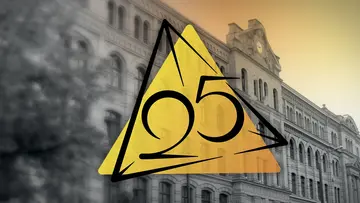
25 Years MPI for Mathematics in the Sciences 25 Years MPI for Mathematics in the Sciences
All other episodes of our column can be found here.
Editorial Contact
Related Content
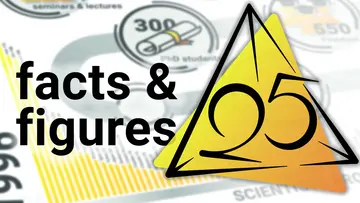
Episode 5 — Facts & Figures Episode 5 — Facts & Figures

Episode 4 — A cool paperclip Episode 4 — A cool paperclip
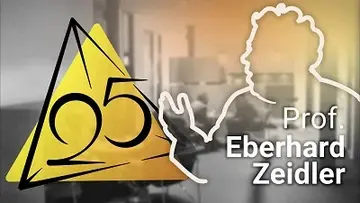
Episode 2 — In memory of our founding director Professor Eberhard Zeidler Episode 2 — In memory of our founding director Professor Eberhard Zeidler
